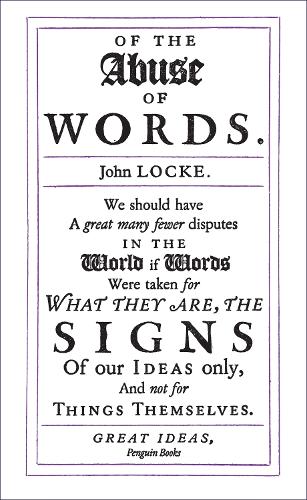
Of the Abuse of Words
(Paperback)
Publishing Details
Of the Abuse of Words
By (Author) John Locke
Penguin Books Ltd
Penguin Books Ltd
26th October 2009
27th August 2009
United Kingdom
Classifications
General
Non Fiction
192
Physical Properties
Paperback
144
Width 111mm, Height 181mm, Spine 8mm
79g
Description
John Locke was one of the greatest figures of the Enlightenment, whose assertion that reason is the key to knowledge changed the face of philosophy. These writings on thought, ideas, perception, truth and language are some of the most influential in the history of Western thought. Throughout history, some books have changed the world. They have transformed the way we see ourselves - and each other. They have inspired debate, dissent, war and revolution. They have enlightened, outraged, provoked and comforted. They have enriched lives - and destroyed them. Now Penguin brings you the works of the great thinkers, pioneers, radicals and visionaries whose ideas shook civilization and helped make us who we are.
Author Bio
John Locke (1632-1704) was educated at Christ Church, Oxford and held various academic posts at that university, lecturing on Greek and rhetoric. However, his interests lay in medicine and the new experimental sciences and in 1667 he became personal physician to the Earl of Shaftesbury. Under the influence of Shaftesbury, Locke developed his ideas on politics, property, trade, monarchy and the mind. Shaftesbury became a bitter opponent of Charles II and was involved in the plot of 1683. This forced Locke to flee in exile to Holland, but he returned after 1688 and began to publish his most famous works. He wrote also on theology, education, and in defence of religous tolerance, while founding the analytic philosophy of the mind.
